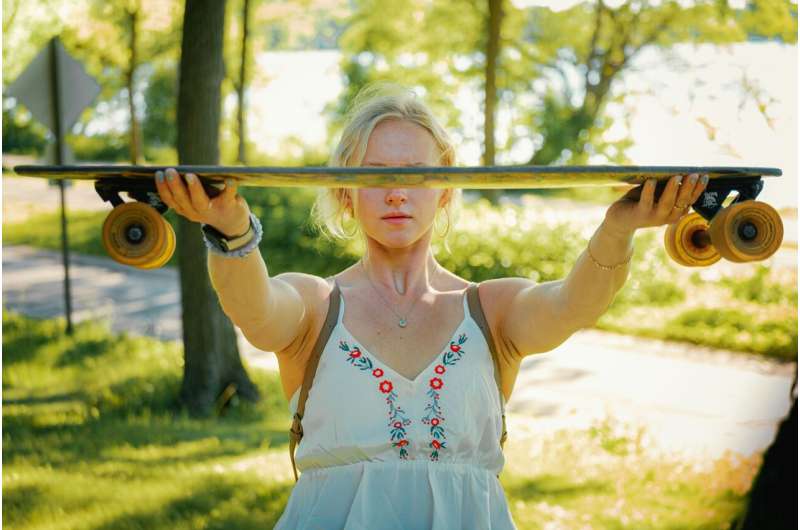This article has been reviewed according to Science X's editorial process and policies. Editors have highlighted the following attributes while ensuring the content's credibility:
fact-checked
trusted source
proofread
Skateboarding shown to benefit mental health of young women

Research by Nottingham Trent University involved 48 female skateboarders aged 8–27, of varying ability and practicing a range of approaches and styles, from skateboarding spaces and communities in both urban and rural locations.
The research, "'Free therapy': young woman skateboarders, mental health, and body self-compassion," is published in the International Review for the Sociology of Sport.
Interviews and focus groups questioned the young women on how skateboarding contributes to their mental health and well-being.
The discussions considered aspects of freedom and fun, focus and flow, direct mental health benefits, social connectedness, and body self-compassion and physical health.
Respondents spoke about the fun and exhilaration of the sport, especially in relation to achieving an adrenaline rush, and the feeling of physical freedom which comes with confidence on the board.
Along with excitement, the young women also discussed their experiences of focus and a sense of flow, with the concentration and immersion needed for skateboarding giving them a sense of well-being and calm. This also allowed them to be in the present moment without intrusive thoughts—giving them an escape from difficult life events.
This deep focus was also linked with body self-compassion and trust, with the skateboarders trusting their bodies to have a sense of what to do next without worrying about limitations or failings.
Several of the young women spoke about the performative and competitive aspects of skateboarding and had consciously stepped away from the constant desire to improve to avoid any stress.
While some find it harder to become full members of local skateboarding communities, others benefit from the increased take-up of skateboarding by young women, finding community in girl-dominated groups or regular woman and girl sessions in managed skateparks.
They particularly benefited from the joy, calm and mutual recognition of sharing their skateboarding experiences with friends, and even spoke about finding communities away from their home cities and countries.
The research forms part of a wider 20-month study of the lived experiences of young woman skateboarders led by Professor Carrie Paechter, Professor of Childhood, Youth and Family Life at NTU's School of Social Sciences.
Professor Paechter said, "Skateboarding is often perceived as a risky and male-dominated activity, but it has the potential to support better physical and mental health in young women and girls.
"We can see from the research that it offers a unique space for young women, who can be vulnerable in terms of mental health and body positivity, to cultivate body self-compassion, find community, and enhance their overall well-being.
"Even at international level, failing and falling is built into the competition and there is considerable mutual support and encouragement between girl and young woman competitors in particular.
"I hope this ethos continues and encourages more young women to skate so they can experience the trust in their bodies, social interconnectedness, and the excitement, joy, and calm of skateboarding."
More information: Paechter, C, et al. 'Free therapy': young woman skateboarders, mental health, and body self-compassion. International Review for the Sociology of Sport (2024) irep.ntu.ac.uk/id/eprint/51767
Provided by Nottingham Trent University



















